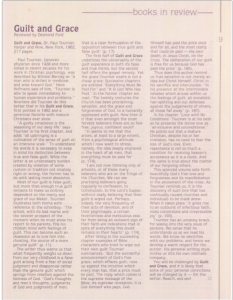Book Review – Guilt and Grace
Jun 5, 2014 5077
reviewed by Desmond Ford
Excerpt:
Paul Tournier, Genevan physician since 1928 and more noted in recent decades for his work in Christian psychology, was described by William Barclay as “a man who is skilled in medicine and wise toward God.” Hans Hofmann said of him, “Tournier is able to speak immediately to human experience and problems.” Nowhere did Tournier do this better that in his Guilt and Grace, first printed in 1962 and a perennial favorite with mature Christians ever since.
“A guilty conscience is the seasoning of our daily life” says Tournier in his first chapter, and adds “all upbringing is a cultivation of the sense of guilt on an intensive scale.” To understand his words it is necessary to keep in mind his distinction between true and false guilt. While the latter is an unnecessary burden
created by violation of some custom or tradition not innately right or wrong, the former has to do with lasting moral absolutes.
Most of our guilt is false guilt, but more than enough true guilt remains to make us entirely dependent on the mercy and grace of our Maker. Tournier illustrates both forms with reference to the schoolboy: “The school, with its bad marks and the sinister prospect of the moment when he must show his report to his parents, fills his childish mind with feelings of guilt. This can become such an obsession as to lure him into cheating, the source of a more genuine guilt” (p. 11).
The writer thus warns us that what frequently weighs us down from our very childhood is a false guilt arising from a fear of social judgment and disapproval rather than the genuine guilt which springs from rebellion against the holiness of God. “God’s thoughts and men’s thoughts; judgments of God and judgments of men; that is a clear formulation of the opposition between true guilt and false guilt” (p. 17).
The first half of Guilt and Grace underlines the universality of the guilt experience in both its false and true forms, but the second half offers the gospel remedy. Yet the grace Tournier exalts is not a cheap grace. Successive chapters are entitled “Everything Must Be Paid For” and “It Is God Who Has Paid.” In the former chapter we read: “For twenty centuries the Church has been proclaiming salvation, and the grace and forgiveness of God, to a humanity oppressed with guilt. How then is it that even amongst the most fervent believers there are so few free, joyous, confident souls? ”

